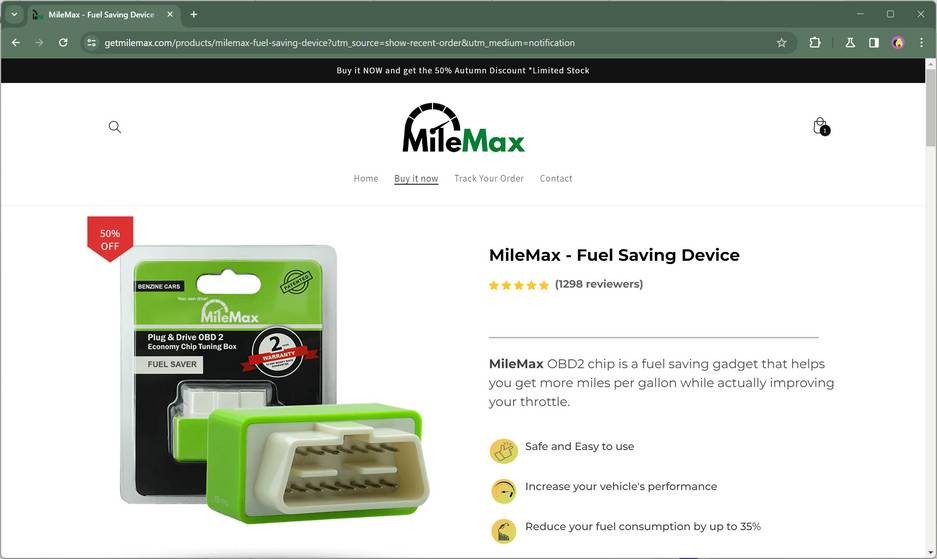With fluctuating gas prices, finding ways to improve fuel efficiency is a top priority for many drivers. The Milemax Obd2 fuel saver claims to boost your car’s gas mileage by up to 35% by simply plugging it into your vehicle’s OBD-II port. But does this device live up to the hype, or is it just another automotive gimmick? This article delves into the MileMax OBD2, examining its claims, analyzing user feedback, and exploring expert opinions to determine if it’s a worthwhile investment.
 MileMax OBD2 Device
MileMax OBD2 Device
How MileMax OBD2 Claims to Improve Fuel Efficiency
MileMax OBD2 asserts that it utilizes artificial intelligence (AI) to optimize your car’s engine control unit (ECU). By analyzing your driving habits and making real-time adjustments to parameters like air/fuel ratio, boost pressure, and injection timing, it claims to significantly enhance fuel economy and overall performance. The manufacturer states that after driving 150 miles, the device adapts to your vehicle’s specific needs, leading to substantial fuel savings.
Examining the Evidence: Does MileMax OBD2 Deliver?
Despite the bold claims, there’s a lack of independent, scientific data to support the advertised 35% fuel economy increase. The MileMax website offers no concrete evidence or verifiable test results to substantiate these claims. Experts in the automotive industry express skepticism, noting that such a dramatic improvement from a simple plug-in device is highly improbable. Legitimate fuel-saving technologies typically yield much smaller gains.
User Reviews and Complaints: Mixed Results
Online reviews for MileMax OBD2 paint a mixed picture. While some users report slight improvements in fuel efficiency, many express dissatisfaction, claiming no noticeable change or even a decrease in gas mileage. Some users also report experiencing engine problems after installing the device, including check engine lights and rough idling. This disparity in user experience raises concerns about the device’s actual effectiveness.
Past Fuel Saver Controversies: A Cautionary Tale
The Federal Trade Commission (FTC) has taken action against companies marketing fuel-saving devices with unsubstantiated claims. Several manufacturers have faced legal action for misleading consumers with false promises of significant fuel economy improvements. This history underscores the importance of approaching such products with caution and demanding verifiable proof of performance.
Website Analysis: Red Flags and Concerns
The official MileMax website exhibits several red flags that warrant caution. A lack of detailed company information, an unprofessional design, and questionable testimonials raise concerns about the legitimacy and trustworthiness of the product and its manufacturer. The absence of a money-back guarantee further amplifies these concerns.
Expert Opinions: Skepticism from Automotive Professionals
Automotive experts and mechanics generally express skepticism towards devices like MileMax OBD2. They point out that achieving substantial fuel economy gains typically requires more complex modifications than what a simple plug-in device can offer. The lack of endorsements from reputable industry sources adds to the doubt surrounding the product’s efficacy.
Inside Similar Devices: Unveiling the Truth
Teardowns of similar OBD2 fuel-saving devices often reveal simple circuitry with minimal components, raising questions about their ability to deliver the promised performance enhancements. Some devices have been found to contain nothing more than LEDs and basic electronic components, lacking the sophisticated technology required to significantly impact fuel efficiency.
The Verdict: Is MileMax OBD2 Worth the Investment?
Based on the available evidence, the MileMax OBD2 fuel saver fails to provide convincing proof of its claimed benefits. The lack of independent testing, mixed user reviews, previous FTC actions against similar products, and expert skepticism suggest that the advertised fuel savings are likely exaggerated.
Conclusion: Proceed with Caution
While the desire for improved fuel efficiency is understandable, investing in unproven devices like MileMax OBD2 is likely a waste of money. Focus on proven methods for increasing gas mileage, such as proper tire inflation, regular vehicle maintenance, and adopting fuel-efficient driving habits. Always research thoroughly and seek expert advice before investing in any fuel-saving product.

